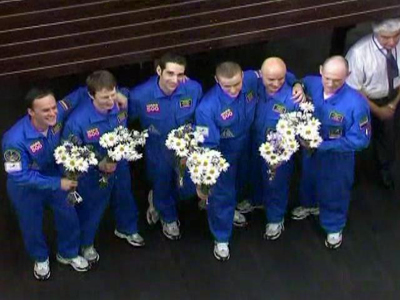
Simulated Mars Traveler Returns to Earth

Oliver Knickel has come back down to earth.
In the past few months, the German army engineer has been on a simulated space trip to Mars.
In reality, that meant spending 105 days in this scientific complex in a Moscow suburb.
The other members of the six-man „Mars 500“ crew were four Russians and a Frenchman.
The mission tested how the men coped with spending a long time in cramped conditions — as during a space flight.
[Oliver Knickel, Member of „Mars 500“ Crew]:
„Most of the experiments tested us psychologically or physically. We tested the effect of isolation on cognitive facilities, for example, or on blood pressure, or the circulatory system.“
Knickel says his time in the capsule has given him a greater appreciation of life on Earth.
[Oliver Knickel, Member of „Mars 500“ Crew]:
„When you get up in the morning and the sun is shining, and you look at the sky, and when it isn’t cloudy, it’s a certain type of blue — that, and listening to the birds singing.“
A real-life mission to Mars would take at least 500 days.
And space agencies are currently preparing another experiment, to last 520 days, which would start next year.
Knickel has now gone back to his day job.
But he hasn’t ruled out taking part in another space study in the future.
 (NTDTV)
(NTDTV)



























vielen Dank, dass Sie unseren Kommentar-Bereich nutzen.
Bitte verzichten Sie auf Unterstellungen, Schimpfworte, aggressive Formulierungen und Werbe-Links. Solche Kommentare werden wir nicht veröffentlichen. Dies umfasst ebenso abschweifende Kommentare, die keinen konkreten Bezug zum jeweiligen Artikel haben. Viele Kommentare waren bisher schon anregend und auf die Themen bezogen. Wir bitten Sie um eine Qualität, die den Artikeln entspricht, so haben wir alle etwas davon.
Da wir die Verantwortung für jeden veröffentlichten Kommentar tragen, geben wir Kommentare erst nach einer Prüfung frei. Je nach Aufkommen kann es deswegen zu zeitlichen Verzögerungen kommen.
Ihre Epoch Times - Redaktion